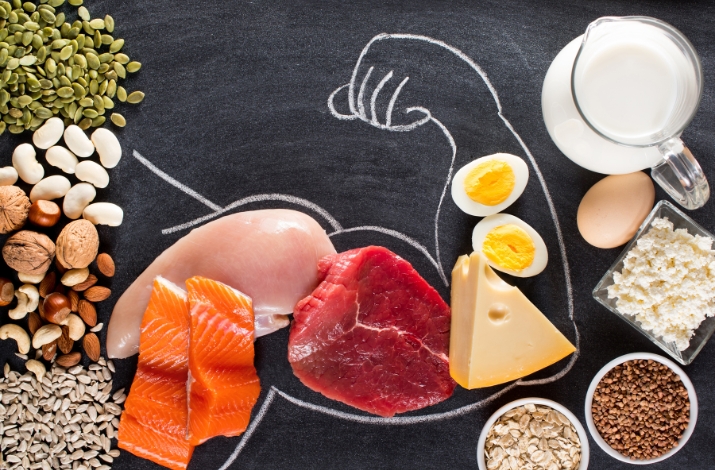More than Muscles: The Multifaceted Benefits of Protein

Protein is an indispensable component of a healthy diet, essential for numerous physiological functions and overall well-being. Inadequate protein intake can lead to a range of health issues, from muscle wasting and immune dysfunction to hormonal imbalances and cognitive decline. It is crucial to consume adequate amounts of protein to support bodily functions, maintain health, and prevent disease. By understanding the importance of protein and ensuring an appropriate intake based on individual needs, we can promote better health and longevity.
Why Protein is Essential
Proteins are involved in the following key functions:
- Structural Components: Proteins such as collagen and keratin provide structure and support to cells and tissues, including skin, hair, and nails.
- Enzymes: Most enzymes, which are catalysts for biochemical reactions, are proteins.
- Transport and Storage: Proteins like hemoglobin transport oxygen in the blood, and ferritin stores iron.
- Immune Function: Antibodies, which are crucial for immune response, are proteins.
- Hormonal Regulation: Many hormones, such as insulin and growth hormone, are proteins that regulate physiological processes.
- Cellular Repair and Maintenance: Proteins are essential for the repair and maintenance of cells.
- Energy Source: When necessary, proteins can be broken down to provide energy for the body.
Consequences of Inadequate Protein Intake
Insufficient protein intake can lead to a multitude of obvious (and some unexpected) health issues, including:
- Muscle Wasting (Sarcopenia): A lack of protein can result in muscle atrophy, particularly in the elderly, leading to weakness and decreased mobility.
- Hormonal Imbalances: Inadequate protein can disrupt the production of hormones such as insulin and thyroid hormones, affecting metabolism and overall health. Further, a deficiency can disrupt hormonal balance, leading to issues such as menstrual irregularities in women and decreased testosterone levels in men.
- Immune Dysfunction: Protein deficiency impairs the immune system, making the body more susceptible to infections and diseases.
- Edema: Low protein levels can lead to fluid accumulation in tissues, causing swelling, particularly in the feet and ankles.
- Hair Loss: Hair is primarily made of protein, and a deficiency can lead to hair thinning and loss.
- Skin and Nail Problems: Inadequate protein can result in dry, flaky skin and brittle nails.
- Fatty Liver: Protein deficiency can lead to the accumulation of fat in the liver, which can progress to liver disease.
- Stunted Growth in Children: Protein is crucial for growth and development, and a deficiency can result in stunted growth and developmental delays in children.
- Bone Fractures: Protein is important for bone health, and a deficiency can lead to an increased risk of fractures due to weakened bones.
- Mood Changes: Amino acids from proteins are precursors to neurotransmitters. A lack of protein can result in mood swings, anxiety, and depression.
- Difficulty in Healing Wounds: Protein is essential for tissue repair. Deficiency can lead to slower wound healing and recovery from injuries.
- Anemia: Protein is necessary for the production of hemoglobin. A deficiency can lead to anemia, characterized by fatigue and weakness.
- Digestive Issues: Protein is important for the structure and function of the gut. A deficiency can lead to digestive problems such as diarrhea and malabsorption.
- Increased Appetite and Cravings: Protein helps in satiety. A lack of it can result in increased hunger and cravings, particularly for sugary foods.
- Brain Fog and Cognitive Decline: Protein is crucial for brain function, and a deficiency can lead to cognitive impairments such as memory loss and difficulty concentrating.
- Fatigue and Weakness: Without sufficient protein, the body can experience overall fatigue and weakness due to impaired muscle function and energy production.
- Heart Health: Protein deficiency can affect the heart muscles and overall cardiovascular health, potentially leading to heart disease.
- Fluid Imbalance: Proteins like albumin help maintain fluid balance in the body. A deficiency can lead to issues with fluid retention and edema.
- Nutrient Malabsorption: Protein is necessary for the proper absorption of other nutrients, such as vitamins and minerals. A deficiency in protein can lead to multiple nutrient deficiencies.
Recommended Daily Protein Intake
The amount of protein an individual needs can vary based on age, sex, activity level, and overall health. The Recommended Dietary Allowance (RDA) for protein is as follows:
- Adults: The RDA for adults has historically been 0.8 grams of protein per kilogram of body weight per day. Though other sources call for as much as 1.8 grams per day.
- Athletes and Highly Active Individuals: Those who are very active or are athletes may require more protein to support muscle repair and growth, typically ranging from 1.2 to 2.4 grams per kilogram of body weight per day.
- Elderly: Older adults may benefit from a higher protein intake to help prevent muscle loss (sarcopenia) and maintain overall health. Recommendations are to consume 1.2 to 1.5 grams per kilogram of body weight per day.
- Pregnant and Lactating Women: Increased protein needs are essential for supporting fetal growth and milk production. Pregnant women are advised to consume about 1.1 grams per kilogram of body weight per day, while lactating women should aim for 1.3 grams per kilogram per day.
References
- Morley, J. E., Argiles, J. M., Evans, W. J., Bhasin, S., Cella, D., Deutz, N. E., … & Fearon, K. C. (2010). Nutritional recommendations for the management of sarcopenia. Journal of the American Medical Directors Association, 11(6), 391-396.
- Bauer, J., Biolo, G., Cederholm, T., Cesari, M., Cruz-Jentoft, A. J., Morley, J. E., … & Boirie, Y. (2013). Evidence-based recommendations for optimal dietary protein intake in older people: a position paper from the PROT-AGE Study Group. Journal of the American Medical Directors Association, 14(8), 542-559.
- Calder, P. C. (2013). Immunonutrition in critically ill patients: time to move on from interesting ideas to confirming efficacy. Proceedings of the Nutrition Society, 72(4), 339-349.
- Moon, J. L., Kim, K., Kim, K. J., Park, S., Park, S. H., & Ko, J. K. (2015). Effects of dietary protein restriction on edema, metabolic acidosis, and anemia in patients with chronic kidney disease. Journal of Renal Nutrition, 25(1), 50-55.
- Trostler, N. (1997). Malnutrition in the elderly. Journal of Nutrition, 127(6), 990S-993S.
- Kumar, N., & Garg, S. (2013). Protein deficiency and skin health. Journal of Clinical and Diagnostic Research, 7(11), 2555-2558.
- Marchesini, G., Bugianesi, E., Forlani, G., Cerrelli, F., Lenzi, M., Manini, R., … & Melchionda, N. (2003). Nonalcoholic fatty liver, steatohepatitis, and the metabolic syndrome. Hepatology, 37(4), 917-923.
- Williams, P., & Sharpe, L. (2010). Protein deficiency and the developing brain. The Journal of Nutrition, 140(6), 1213-1217.
- Heaney, R. P. (2013). Protein intake and bone health: the influence of belief systems on the conduct of nutritional science. The American Journal of Clinical Nutrition, 97(4), 1100-1107.
- Le Floc’h, N., Otten, W., & Merlot, E. (2011). Tryptophan metabolism, from nutrition to potential therapeutic applications. Amino Acids, 41(5), 1195-1205.
- Wolfe, R. R. (2012). The role of dietary protein in optimizing muscle mass, function and health outcomes in older individuals. British Journal of Nutrition, 108(S2), S88-S93.
- McLean, R. R., Mangano, K. M., Hannan, M. T., Kiel, D. P., & Sahni, S. (2016). Dietary protein intake is protective against loss of grip strength among older adults in the Framingham Offspring Cohort. The Journals of Gerontology: Series A, 71(3), 356-361.
- Smith, T. J., & Wahlqvist, M. L. (2015). Protein intake and the risk of osteoporosis and bone fractures in older adults: a systematic review and meta-analysis. British Journal of Nutrition, 114(8), 1269-1277.
- Benton, D. (2010). The influence of dietary status on the cognitive performance of children. Molecular Nutrition & Food Research, 54(4), 457-470.
- Denny, S. D., & Nicklas, B. J. (2006). Protein and its effect on skeletal muscle: quality vs. quantity. Current Opinion in Clinical Nutrition and Metabolic Care, 9(6), 568-572.
- Paddon-Jones, D., & Rasmussen, B. B. (2009). Dietary protein recommendations and the prevention of sarcopenia. Current Opinion in Clinical Nutrition and Metabolic Care, 12(1), 86-90.
- Volpi, E., Campbell, W. W., Dwyer, J. T., Johnson, M. A., Jensen, G. L., Morley, J. E., & Wolfe, R. R. (2013). Is the optimal level of protein intake for older adults greater than the recommended dietary allowance? The Journals of Gerontology Series A: Biological Sciences and Medical Sciences, 68(6), 677-681.
- Lemon, P. W. (1998). Effects of exercise on dietary protein requirements. International Journal of Sport Nutrition and Exercise Metabolism, 8(4), 426-447.
- Tang, J. E., & Phillips, S. M. (2009). Maximizing muscle protein anabolism: the role of protein quality. Current Opinion in Clinical Nutrition and Metabolic Care, 12(1), 66-71.
- Tarnopolsky, M. (2004). Protein requirements for endurance athletes. Nutrition, 20(7-8), 662-668.
This article is for informational and educational purposes only. It is not, nor is it intended to be substitute for professional medical advice, diagnosis, or treatment and should never be relied upon for specific medical advice.




















